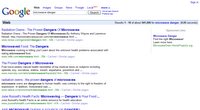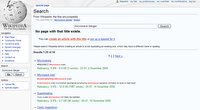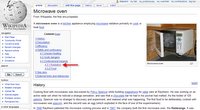At the CAL conference last week I attended one session on the concept of Googlezon. During the conversation one attendee was very anti-Google and even more anti-Wikipedia. She made it clear that her students had searched Google for information on the dangers of microwave ovens and received a lot of false information. (Sites claiming that microwave ovens were dangerous despite all the scientific evidence to the contrary.) Additionally she was very skeptical of the value of Wikipedia since it could be edited by anyone. I started thinking about this some more today and tried a little experiement.
 First, I searched Google for microwave danger and received the resutls shown to the right. As the woman said, nearly all of the first ten results are on the supposed dangers. (Those that aren’t deal with microwaves from cell phones and “Unwise Microwave Oven Experiments”.
First, I searched Google for microwave danger and received the resutls shown to the right. As the woman said, nearly all of the first ten results are on the supposed dangers. (Those that aren’t deal with microwaves from cell phones and “Unwise Microwave Oven Experiments”.
 I then performed the same search in Wikipedia (shown right). Initially I received a list of available pages since there was no page in the system titles “microwave danger”. Both of the first two results sent me to the Wikipedia page titled “Microwave oven”. In the table of contents for this article there is a section on “Controversial hazards: Radiation”. Clicking on that link I get a brief yet, scientifically accurate disussion of the perceived dangers.”
I then performed the same search in Wikipedia (shown right). Initially I received a list of available pages since there was no page in the system titles “microwave danger”. Both of the first two results sent me to the Wikipedia page titled “Microwave oven”. In the table of contents for this article there is a section on “Controversial hazards: Radiation”. Clicking on that link I get a brief yet, scientifically accurate disussion of the perceived dangers.”
 My conclusion: In this case, Wikipedia is much more reliable than Google when it comes to answering the question of the students. Yet, from the comments made during the session, there was going to be ice skating in Hell before that woman was going to point her students to Wikipedia as a reliable source.
My conclusion: In this case, Wikipedia is much more reliable than Google when it comes to answering the question of the students. Yet, from the comments made during the session, there was going to be ice skating in Hell before that woman was going to point her students to Wikipedia as a reliable source.
Nice experiment (or maybe “demonstration” is more like it). As I tried to articulate from my seat in the peanut gallery at the “Googlezon” thing at CAL, I think the lesson should not be “Google is unreliable” or “Wikipedia is unreliable,” but that people need to be skeptical about the information they collect, and need help learning how to evaluate it. This has always been the case, and I think that people have believed a lot of incorrect conventional wisdom long before they jacked in to the web.
I think of looking something up in Wikipedia as similar to asking a knowledgable friend about something: you will probably get some interesting and useful information, but you wouldn’t base an entire academic paper around it. The same thing could be said of a conventional encyclopedia, of course.